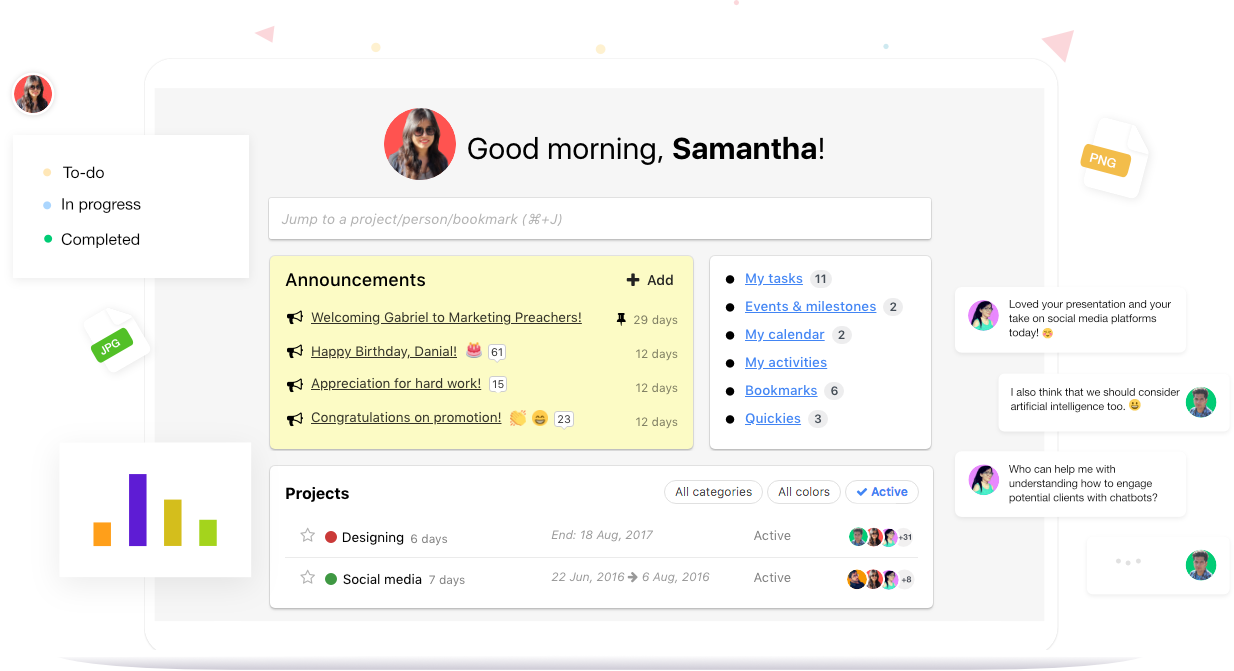Managing multiple projects and teams simultaneously is difficult. Without the right software, getting a handle on your business’ day-to-day and long-term success is near impossible — even for small businesses and freelancers.
Work without business tools is a bit of a porridge.
Plus, emails for team collaboration and sheets for project management simply won’t cut it — these get messy to the extent that’s irreparable.
Reviewing and proofing designs and files gets as clumsy as they can with feedback getting lost in the long email threads. And let’s be honest, “who’ll be working on this?” isn’t the question you want to hear every day.
All of it affects productivity.
The effect of not having tools designed to help you manage tasks and projects is undeniable — there are mistakes, confusion, inaccurate timesheets, and a boatload of more issues that come with the ineffective managing of resources.
Consider this example:
There are tools that help designers and clients collaborate over designs and make feedback clear. They’re called proofing and reviewing tools.
It’s just as this popular AI-powered tool, Grammarly, helps people make their text clear, mistake-free, and impactful. There are tools meant to annotate designs with markup tools that help you give feedback with ease.
There are all kinds of business tools to help you control and improve your business processes.
Eager to learn more about the top 5 tools every business needs? Hint … stay to the end to learn how there’s really a tool built to do it all — but read them all to learn whether you need just one, or an all-in-one powerhouse for your business.
5 Types of Top Business Tools To Manage Work Easily
These are the top 5 tools that are incredibly valuable for businesses of all sizes:
- Chat tools
- Task management tools
- Proofing tools
- Time tracking tools
- All-in-one management tools
Below we’ll give you a quick rundown of these tools and give you top recommendations for the market’s leading options for each category.
1. Chat Tools for Business

What are chat tools?
Team chat tools are known to be a simple way to improve communication among team members. They are faster and easier than emails and phone calls. Teams can directly message each other and even have group chats.
Asking simple questions, getting fast replies, or bouncing off ideas become more convenient than ever. Some of the team chat tools are also known for their file-sharing capabilities and unlimited message history.
Examples of chat tools:
Slack is one of the most popular team chat tools. It claims to replace email inside your company. And it also helps teams keep conversations organized. They call themselves “the smart alternative to email”.
Chanty is another team chat tool, mostly known for being a simpler and easier tool than Slack.
There are other chat tools, such as Fleep, HipChat, etc.
You should use chat tools when:
Instant messaging chat apps may kill productivity, so they are supposed to work best for small- to medium-sized businesses. Some of these chat apps are also expensive for the limited set of tools they offer, so choose the one that doesn’t burn a hole in your pocket.
2. Task Management Tools
What are task management tools?
Task management tools, as the name suggests, are there to help you with management-specific tasks. They enable you to add tasks, name them and categorize them.
They also give the ability to set start and due dates, assign members to specific tasks, add comments, and more.
Examples of task management tools:
Trello is one popular tool used for task management. It has the capability to let you work more collaboratively and get more done. It has boards, lists, and cards, which certainly help you visually prioritize your tasks.
Bonsai is a phenomenal freelance task management solution that lets you create reusable task templates and collaborate with others — assign tasks, add comments, and a load more. Plus, it has built-in time tracking for automated timesheets, easy client billing, and efficient time management.
You should use task management tools when:
Task management tools work best when your tasks are independent of a project and are mostly to be taken care of at an individual level. For example, tasks of a customer care executive or say support.
On the other hand, tasks involved in product development projects are more complex, with multiple people and various kinds of tasks involved, in which case basic task management wouldn’t suffice.
In this instance, we highly recommend a tool like Bonsai that gives you the means to manage all your tasks, projects, clients, and even finances and taxes, all under one roof.
3. Proofing and Reviewing Tools
What are proofing and review tools?
Proofing and review tools help you manage the review and feedback process. When you’re tired of searching for not-so-specific feedback on files in long email threads, that’s when proofing and review tools come to the rescue.
Examples of proofing tools:
Filestage makes content review and proofing for teams easier. You can review videos, images, and documents all in one place.
You should use a proofing and review tool when:
Proofing tools work the best for small- to medium-sized businesses, basically when proofing and review are around, let’s say, one project and the only tasks to fulfill are around proofing, review, and feedback.
There are all-in-one tools that we’ll discuss later in this article with capabilities of proofing files and documents in addition to projects, reports, time tracking, etc.
4. Time-Tracking Tools
What are time-tracking tools?
Time tracking tools allow you to monitor and log the time you spend on certain tasks or projects. This is helpful for accurate timesheets, client billing, or just simply to improve your productivity.
Many of the best time-tracking solutions let you manually or automatically log time entries, and pause and continue the timer when needed, plus tools like Bonsai give you apps for all leading operating systems — mobile or PC for complete flexibility.
Examples of time-tracking tools:
Toggl is a time tracking tool that has one-click timers and also tracking timers to remind you when you need to track time in case you forget to. It also has over 100+ integrations.
Bonsai is a go-to project time-tracking tool for freelancers, contractors, and small businesses looking for a reliable, flexible time-tracking solution. You can track the time spent on tasks on the web, mobile, Mac, or Windows device.
You should use time tracking tools when:
Time tracking tools work best when you have to differentiate between billable and non-billable hours. However, as mentioned earlier, there are all-in-one tools that offer more features than just time tracking — let’s get into it.
5. All-in-One Business Tools
What are all-in-one project, team, and task management tools?
So, we evidently saved the best for the last. All-in-one project, team, and task management software are the ones that let you do all the above and a lot more.
Mostly known as project management software, these tools offer task management, file management, proofing and review, chat, planning, scheduling, time tracking, and even reporting, all under one roof.
They replace multiple tools, such as Slack (for chat), Toggl (for time tracking), Google Drive (for files), and Basecamp (for projects). This means that you don’t need to switch between different tools to manage different aspects of your business, or worry about costly integrations.
Examples of project, team, and task management software:
ProofHub is a project and team collaboration software that puts every tool that you and your team need in one place.
Bonsai takes it a step further. You get time tracking, task and project management, accounting and tax tools, a built-in client CRM and incredibly powerful business automation — all for as little as $17/month.
You should use an all-in-one project management software when:
Always, really. Whether you’re in development, design, support, marketing, content, or anything else — these tools are invaluable for businesses of all sizes.
All-in-one solutions like Bonsai are designed to help you stay on top of all your tasks, projects, clients, finances, and more, all under one roof — this ultimately helps you save time, improve the accuracy of your timesheets, expenses, and tax, amongst countless other benefits.
Conclusion:
There are various kinds of business tools to manage work and teams of all sizes. Investment in an all-in-one tool like Bonsai will definitely bring you results that using multiple tools cannot bring. Try it risk-free today with the 14-day free trial and money-back guarantee.
Read more: Ten Productivity Tools Every Business Owner Needs



